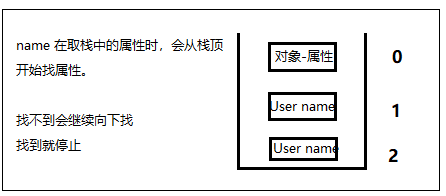struts2[3.3]OGNL表示式語句與struts2框架的結合原理
阿新 • • 發佈:2018-11-28
1.1OGNL由三個部分組成:表示式、Root、Context。而Root和Context組成了OGNLContext,struts2的一個OGNLContext叫做ValueStack,而valueStack就是由Root和Context組成。在Root中存放的是棧;在Context中存放的是ActionContext 資料中心。

啥是棧呢?棧是一種資料結構,我們簡單的瞭解一下,它的資料裝載方式為先進後出,

具體需要深入瞭解的同學可以注意一下!
1.2棧原理


棧裡面放的是什麼呢?我們看一個例子:
新建一個Demo1Action.class:
package com.aisino.b_showVS;
import com.opensymphony.xwork2.ActionSupport;
public class Demo1Action extends ActionSupport {
@Override
public String execute() throws Exception {
System.out.println("Demo1Action");
return SUCCESS;
}
}
再新建一個轉發頁面showVS.jsp:
<%@ page language="java" contentType="text/html; charset=UTF-8" pageEncoding="UTF-8"%> <!-- 我們需要導一個debug標籤,她是struts2內建標籤 --> <%@ taglib prefix="s" uri="/struts-tags" %> <!DOCTYPE html PUBLIC "-//W3C//DTD HTML 4.01 Transitional//EN" "http://www.w3.org/TR/html4/loose.dtd"> <html> <head> <meta http-equiv="Content-Type" content="text/html; charset=UTF-8"> <title>Insert title here</title> </head> <body> <!-- 除錯標籤 --> <s:debug></s:debug> </body> </html>
在struts.xml中配置action:
<package name="showVS" namespace="/" extends="struts-default" >
<action name="Demo1Action" class="com.aisino.b_showVS.Demo1Action" method="execute" >
<result name="success" type="dispatcher" >/showVS.jsp</result>
</action>
</package>在web.xml中配置核心過濾器:
<!-- struts2核心過濾器 -->
<filter>
<filter-name>struts2</filter-name>
<filter-class>org.apache.struts2.dispatcher.ng.filter.StrutsPrepareAndExecuteFilter</filter-class>
</filter>
<filter-mapping>
<filter-name>struts2</filter-name>
<url-pattern>/*</url-pattern>
</filter-mapping>釋出專案,訪問http://localhost:8080/sturts2_day03Test/Demo1Action,點選一下[Debug]就可以看到我們的值棧儲存的是什麼東西了!
Root:

Context:

先到這裡~
